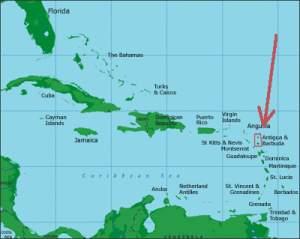Over five years ago, the World Trade Organization (WTO) ruled that Antigua and Barbuda is entitled to compensation for damages it suffered when the United States acted unilaterally to prevent American residents from participating in online gambling. This action caused Antigua’s online gambling/gaming industry to contract in short order from one that was worth $3.4 billion and employing over 4,000 people to one worth only a fraction of that amount and employing fewer than 500.
 In fact, this tiny Caribbean nation has been on a quixotic quest for over a decade to get the mighty USA to reconcile the moral/political aversion that compelled it to make online gambling illegal with the amoral/economic windfall that compelled Antigua to make it legal.
In fact, this tiny Caribbean nation has been on a quixotic quest for over a decade to get the mighty USA to reconcile the moral/political aversion that compelled it to make online gambling illegal with the amoral/economic windfall that compelled Antigua to make it legal.
Here, in part, is how Caribbean News Now reported the latest developments on Tuesday (January 29, 2013):
Antigua is seeking final WTO approval of its sanctions in order to compel the U.S. either to comply with the rulings in Antigua’s favour in the gambling dispute or to negotiate a fair and reasonable solution with the Antiguan government.
Alas, abiding American economic nationalism is such that the world’s only superpower could not care any less what economic impact its actions have on powerless countries like Antigua. The United States clearly sees no reason to negotiate over actions taken pursuant to what it considers sovereign interests.
The United States has also been repeatedly judged to be in violation of its WTO commitments by the organization’s dispute settlement panels… Opinion in Congress sometimes encourages this behavior; legislators are less likely to question the legitimacy of U.S. conduct than to question the WTO’s authority to pass judgment over the United States.
(Council of Foreign Relations, March 2007)
 No doubt this is why, according to the New York Times, the WTO granted Antigua permission on Monday to violate American intellectual property rights to make up its gaming losses, calculated at $21 million a year. Except that the WTO granting Antigua permission to implement retaliatory sanctions against the United States (to force it “to negotiate a fair and reasonable solution”) is rather like the UN granting Palestinians permission to reclaim their pre-1967 borders against Israel (to force it to negotiate a fair and reasonable two-state solution): in each case the permission seems more like a dare.
No doubt this is why, according to the New York Times, the WTO granted Antigua permission on Monday to violate American intellectual property rights to make up its gaming losses, calculated at $21 million a year. Except that the WTO granting Antigua permission to implement retaliatory sanctions against the United States (to force it “to negotiate a fair and reasonable solution”) is rather like the UN granting Palestinians permission to reclaim their pre-1967 borders against Israel (to force it to negotiate a fair and reasonable two-state solution): in each case the permission seems more like a dare.
As it happens, I have written many commentaries on this ongoing dispute. Most notably I admonished Antigua early on to do all it can to join other countries to present a multilateral case against the United States. Because redressing the determinative imbalance of power was the only hope it would have of enforcing any WTO judgment.
Below are extensive excerpts from two of those commentaries that I believe are worth reprising: firstly, because they put this week’s developments into more informed context; and secondly, because they now seem so prescient.
___________
- From United States Tries to Regulate Business in Caribbean … Again (published by Caribbean Net News on 1 March 2006):
It must be recognized from the outset that if Antigua were a member of a properly integrated community of Caribbean nations, the U.S. would have been far more likely to comply with the requirements of the WTO ruling…
Antigua pleading alone to get the United States to change its position is rather like a flea pricking the butt of an elephant to get it to change its course.
Because unless a country (or a group of countries) can telegraph how its political or economic power can adversely affect the U.S.’s hegemonic interest (e.g. on illegal immigration or drug trafficking), it would be lucky to get even diplomatic niceties in response to such a plea.
- From Online Gambling in Antigua is Dead (published by Caribbean Net News on 21 July 2006):
 In my 1 March commentary I criticized the ill-fated odyssey of the Antiguan government to compel the U.S. government’s compliance with a WTO directive to cease and desist its restrictive policies towards online gaming. I did so because the Antiguans were placing too much faith and credit in the power of the WTO to enforce its ruling, which held that U.S. policies violated global market access and prohibited customers from engaging in a legal commercial activity in a foreign jurisdiction.
In my 1 March commentary I criticized the ill-fated odyssey of the Antiguan government to compel the U.S. government’s compliance with a WTO directive to cease and desist its restrictive policies towards online gaming. I did so because the Antiguans were placing too much faith and credit in the power of the WTO to enforce its ruling, which held that U.S. policies violated global market access and prohibited customers from engaging in a legal commercial activity in a foreign jurisdiction.
Yet, despite my admonition that looking to the WTO is futile, the Antiguans continue to do so; taking fools comfort in one hollow, if not pyrrhic, WTO ruling after another. (Only countries with retaliatory economic power — to place punitive tariffs on imported goods, for example — have any chance of enforcing such rulings.)
For years now, the United States has telegraphed that it has no intention of complying with WTO rulings on Internet gambling. Indeed, its response to the first significant ruling against it in this regard was to arrest and prosecute Jay Cohen, an American citizen, for operating the online gaming company World Sports Exchange out of Antigua. This, even though Cohen’s activities were not only legal but actually licensed by the Antiguan government…
Clearly, this extraterritorial reach of U.S. jurisdiction — to regulate and control online gaming — has grave legal and financial ramifications for the entire industry, which generates half of its $12 billion annual revenue from U.S. residents. After all, if the United States can cause Betonsports, the biggest fish in this pond, to go under, then all other online gaming companies (i.e., relative minnows) must feel doomed to drown…
Therefore, I urge online gaming operators to limit their customer base to people outside the United States. Because freedom and a market share of an industry valued at only $6 billion is clearly preferable to ending up in prison like Cohen….
__________
Affirming my prescience, the United States has not only arrested and prosecuted several Americans involved in running online gambling operations, it responded to these latest developments by warning Antigua on Monday:
… not to retaliate against U.S. restrictions on Internet gambling by suspending American copyrights or patents, a move it said would authorize the ‘theft’ of intellectual property like movies and music.
(Reuters, January 28, 2013)
Well, despite Antigua not heeding any of my previous admonitions, I feel constrained to offer just one more: It might be that an acute inferiority complex is causing this pee-wee nation to continue fighting this losing battle against the United States. It might be that it covets some perverse honor in being this century’s Cuba. And/or it might be that it sees some sustainable economic benefit in branding itself as a haven for high-tech pirates.
Whatever the case, I hereby admonish Antigua to stop wasting money on mercenary lawyers, lobbyists and others to fight this case and just concede all legal points to the United States. Then affect appropriate Caribbean-Basin humility and request, not legal compensation, but financial aid to make up the economic losses and opportunity costs this ill-advised 10-year dispute has caused. I suspect the United States would be happy to oblige….
Mind you, in the meantime, if the United States deems it morally/politically expedient to legalize online gambling, which is not at all farfetched, what little remains of Antigua’s online gambling industry would be gobbled up in an instant.
Finally, I feel constrained to cite the many Antiguan officials who were implicated in facilitating the billion-dollar Ponzi/Madoff scheme of Texan “Sir” Allen Stanford. After all, this must have had a depressing effect on what little sympathy Antigua had in the international community for its cause….
Related commentaries:
Final nail in coffin of online gambling